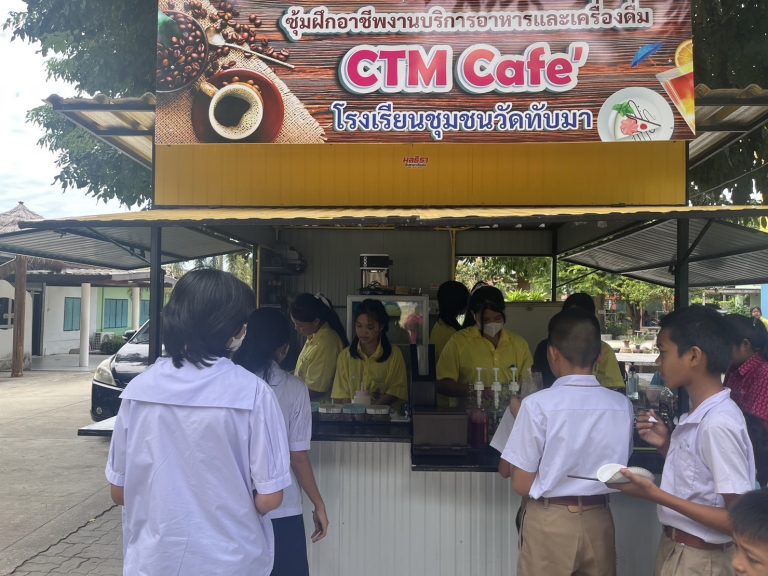Coffee Shop Teacher
According to our leadership theory, “finding one’s place” is one of the most important processes that would allow a leader to promote quality education for all children. To help you understand this concept, Franc-Nattha Rimfai, our fellow from cohort 9, and her story illustrates how “finding one’s place” endorses leadership and improves education for her students.

Using coffee shop to kickstart students’ career paths
Several school visits have proved to the executive team at Wat Thapma Community School that having a coffee shop can improve vocational skills for students. Franc, with her personal interest in coffee shop business, was assigned to be part of the coffee shop project “I wasn’t the leader, though, it must be a civil servant teacher. Still, during the transition period when the former lead moved back to her hometown and we had to wait for the new team lead, I got the chance to do more,” Franc told us how it all started.
Overcoming challenges to enable vocational skills training
“Use this money to grow and develop careers for the students” are words that Franc remembers fondly after receiving her first budget for the coffeeshop. She was determined to make the most out of the money. “It’s not too much money but also not too little. I was told that they used to get more money but it still wasn’t enough. I asked myself, “why not?” and started asking around to find out where they bought all the supplies, how they bought them, using which kind of transportation … they weren’t at a loss before I joined but I didn’t see the need to spend that much if we could find something cheaper, so I intervened.”
With all the information, Franc thought of ways to reduce cost and increase profit which was crucial to running the shop smoothly, but more importantly, the money will become scholarships for students. “At the end of the semester, students who worked here would receive a scholarship,” Franc proudly told us.
However, all of that wouldn’t happen if no student came to work at the shop.. Franc spent some time working at the shop herself to understand why no one wanted to join. “That’s when I understood the problem: students hate chores, like having to wash the glasses all the time, and they don’t get anything tangible in return, so I had to find ways to make the process more convenient for them.”
Besides finding the right equipment for mixing the drinks, Franc and her team agreed that they need to compensate the students. “I talked to other teachers and suggested that students should receive welfare and compensation, just like part-time workers. They should clock in, clock out, and have teachers sign their timesheets, which values 20 bahts.. They come to work, so they should get paid for it.”
Franc also saw that accounting management could be improved. “Before, it was done manually, which was not real-time nor was it transparent, so I designed a shared online spreadsheet to record income and expenses. Then I explained what each team member has to do with this sheet daily. This way, the school’s executives and everyone involved with the shop could see financial status whenever they want.”
Short-term and long-term impact on students
With all the support, Franc was able to make profit for the shop and develop student’s vocational skills in less than two months. Currently, the shop runs smoothly, even without Franc around. “They can create packaging, manage the account themselves, and the shop is now full of students working every day. They don’t feel it’s hard work anymore and the compensation is good. Twenty bahts per day for five days a week, that’s a hundred baht, which is a lot for the students,” Franc proudly presented.
Besides the compensation, the students gained skills that they can utilize long-term. “Students learned to self-manage, to be more responsible, had roles assigned to them, and got to learn more than their classmates … if they work here from grade 7th-9th, they gain three years of experience in a coffee shop, which they can use to further their career path,” Franc explained.
What about Franc?
Having found her place as the “Coffee Shop Teacher,” Franc has grown and learned to manage her relationships with people from all walks of life. “I got a very good lesson on how to behave around different groups of people,” this skill will be very important in her last year as a Fellow and the rest of her career path.
Franc also found a side of her that she did not even know existed. “I learned that I have management skills. I also learned to manage my expectations: not everything will go as planned and I have to be more flexible.”
Most importantly, Franc used this opportunity to develop her leadership skills and found her place to make a difference. “If it’s not me, then who? I know that it can be better, so I must utilize and build on my leadership skills to make it happen — to make this coffee shop happen.”
Franc’s story as the “Coffee Shop Teacher” shows that there are various ways and various situations to “find one’s place” to develop leadership and create change in education, moving towards Teach For Thailand’s united goal: to ensure that children in Thailand have access to quality education, so they can shape a better future for themselves.

